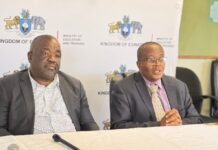Irregularities in the COVID-19 expenditure has left the PAC stunned as it keeps escalating despite the World Health Organisation (WHO) having declared the pandemic no longer a public health emergency.
This has been highlighted in the audit of financial statements of the Eswatini COVID-19 Emergency Response and Preparedness Project.
The first query noted by Auditor General (AG) Timothy Matsebula was that of the ministry of health not being vigilant on spending by the project, which resulted in an escalation in costs of a loan from the World Bank by E43 million.
There was another unaccounted for expenditure related to unaccounted fuel expenditure and undelivered assets that were paid for through the loan.
Members of the Public Accounts Committee (PAC) raised concerns regarding the continued expenditure on the project despite the declaration from WHO.
This transpired during the ministry’s fourth and fifth appearance before the committee this week, to respond to queries detailed in the compliance audit report for the financial year ended March 31, 2024.
In the first query under the project, AG Matsebula noted that the ministry was not vigilant regarding spending on the project, which increased from E36 720 355 in the financial year ended March 2023 to E79 296 727 in the financial year ended March 2024 in an effort to meet the objectives of the loan.
He observed that this was despite the World Health Organisation declaring on May 5, 2023 that COVID-19 was no longer constituted as a public health emergency of international concern. He noted that the ministry of health continued to spend on components initially intended for COVID-19 emergency response without demonstrating sensitivity to the decline in COVID-19 prevalence and that no efforts were made to revisit or realign the loan objectives, as further illustrated by the rest of the audit findings.
ALSO READ: The next frontier of Africa’s financial integration
Matsebula outlined that the Public Finance and Management Act of 2017 (Section 11(2)) mandates that Controlling Officers implement capital project evaluation systems to prevent financial mismanagement.
The COVID-19 Emergency Response was according to the AG intended to address pandemic control through case management, health system readiness, social distancing, communication, and overall response efforts.
Matsebula warned the Controlling Officer, Principal Secretary Khanya Mabuza that failure to reassess the relevance of expenditures following the change in global health status may result in Emaswati repaying a loan that did not deliver value-for-money, thereby imposing an unnecessary financial burden on the public.
He advised Mabuza that the ministry should reduce expenditure on these activities and return the unutilised loan proceeds to the lender in order to ease the national repayment obligation.
On another issue, under the same project, the AG noted the some vehicles were fuelled to full tanks more than once per day, and that cash receipts bearing vehicle registration, logbooks and refuelling authorities were not provided for inspection.
He also noted that the ministry submitted summary statements showing litres received and amounts charged per vehicle per day, but supporting documents to verify these amounts were missing.
Additionally, purchase order number 0235 dated December 23, 2023 with Puma Energy Eswatini stipulated a daily fuel limit of E800 per vehicle, yet several vehicles exceeded this limit.
Both the ministry and the supplier failed to monitor adherence to the purchase order, leaving the matter unresolved.
The AG also noted that a mobile X-ray worth E1 670 379.83 was paid for, but not delivered at RFM Hospital with supporting documents including invoice number 082858 from ASD Medical dated September 27, 2022 and purchase order number 0488 dated August 1, 2022.
However, the AG noted that no delivery note was attached to the payment voucher during the asset verification exercise conducted on October 25, 2024. It was established that the mobile X-ray was not present at the facility.
Matsebula advised the Controlling Officer that the ministry should ensure that the mobile X-ray was delivered to RFM Hospital without further delay.
In response, the Controlling Officer confirmed that the mobile X-ray was delivered to RFM Hospital and recorded in the Stores Ledger (folio # M-2) and Inward Book (Page 12304), with the asset placed in the X-ray department.
The ministry acknowledged the audit observation and noted that the mobile X-ray would be tested during the FY 2025 audit
Matsebula said the absence of the paid mobile X-ray during verification, despite records indicating its receipt, reveals weaknesses in asset control and management. The presence of only the donated X-ray from Dr Kim, and not the purchased asset, raises serious concerns about potential misplacement or loss of public funds.
In response, the ministry acknowledged the observation regarding the mobile X-ray unit and wished to clarify that the mobile X-ray was duly delivered to RFM Hospital and is currently located within the Radiology Department.
“The asset was properly recorded in the Stores Ledger (folio #M-2) and the Inward Book (Page 12304), in accordance with standard asset management procedures,” said the ministry.
Matsebula reported that upon receiving the audit query, the ministry promptly responded by conducting an immediate physical verification at RFM Hospital to confirm the status of the mobile X-ray. This verification confirmed that the X-ray was present and available, addressing the initial concern about its non-delivery.
He said the RFM Hospital has further confirmed the receipt and operational readiness of the mobile X-ray unit. While the absence of a delivery note attached to the payment voucher is acknowledged, this has been addressed by strengthening documentation and asset control protocols to ensure full traceability of all procured items going forward










